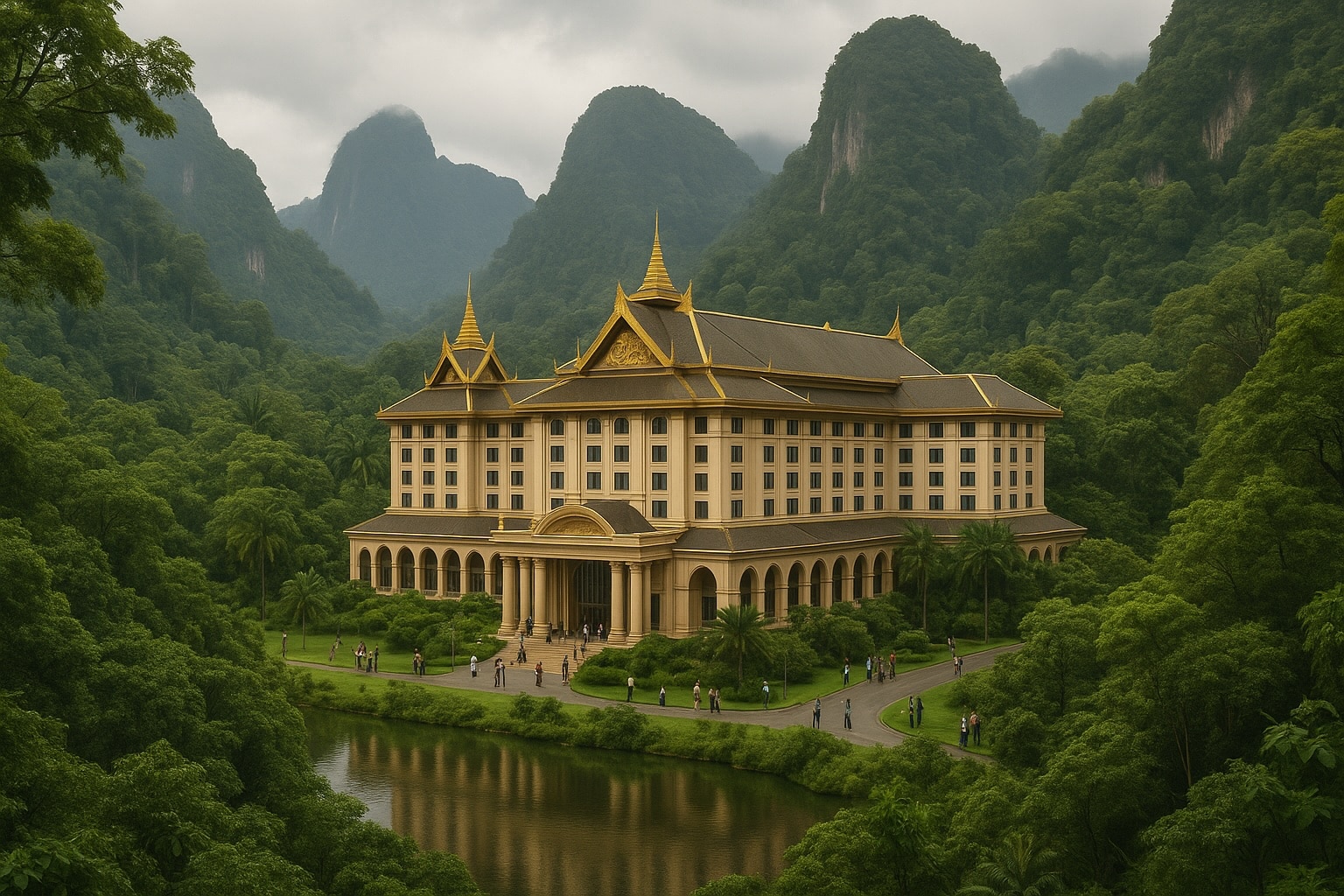As Thailand stands on the brink of potentially legalizing casino gambling through integrated resorts, industry experts are taking notice. Ed Bowers, president of global development at MGM International, recently made waves by suggesting Thailand could soon become Asia’s leading destination for integrated resort investments. Speaking at the G2E Asia Forum, Bowers painted an ambitious picture of Thailand’s gaming potential, suggesting that with proper legislation and infrastructure, the country could generate over $10 billion in annual gross gaming revenue.
Thailand’s Tourism Success Creates Perfect Foundation for Gaming Expansion
Thailand’s tourism industry has demonstrated remarkable resilience and growth, providing fertile ground for a potential gambling sector. The latest statistics show that Thailand welcomed over 35.54 million foreign tourists in 2024, representing a substantial 26.27% increase from the previous year. Chinese tourists comprised the largest market segment with 6.73 million arrivals, followed by Malaysia (4.95 million) and India (2.12 million).
This impressive recovery has been fueled by strategic government initiatives that have made Thailand increasingly accessible. The visa exemption policy for citizens of 93 countries, allowing stays up to 60 days, has significantly boosted visitor numbers. Additionally, the elimination of TM.6 immigration forms at 16 key border crossings has streamlined entry processes, making Thailand more appealing to international travelers.
The aviation sector has played a crucial role in this tourism boom. International airlines have resumed routes and added new ones from cities worldwide, increasing total airline seat capacity into Thailand to 47 million in 2024-a remarkable 26% rise compared to 2023. During peak season in December, over 311 additional flights were scheduled, adding more than 70,000 seats to accommodate holiday travelers.
With tourism already accounting for 14.16% of Thailand’s GDP and 11.33% of employment (as of Q2 2024), the addition of integrated resorts with casino components could potentially boost these numbers significantly higher.
Learning from Asia’s Casino Success Stories
In assessing Thailand’s potential, Bowers highlighted how other Asian destinations have successfully integrated gambling into their tourism ecosystems. Macau, which traditionally focused on high-rolling VIP clients, has evolved toward more diversified attractions incorporating cultural, culinary, and environmental elements. This transformation has broadened Macau’s appeal beyond traditional and crypto gambling enthusiasts.
The evolution has paid dividends: Macau generated a gross gaming revenue of approximately US$28.39 billion in 2024, representing a 23.8% year-on-year increase. While impressive, this remains below the pre-pandemic level, suggesting room for further growth.
Singapore offers another instructive model that Thailand appears to be emulating. By developing integrated resorts that combine gaming with diverse attractions, Singapore has successfully boosted tourism while implementing responsible gaming measures to protect local communities. This “integrated resort” concept-combining casinos with hotels, shopping malls, convention centers, theme parks, and other entertainment options-has proven particularly effective at attracting a broad demographic of visitors.
Regional Challenges Create Opportunity for Thailand
While discussing Thailand’s potential, Bowers highlighted challenges facing other Asian gaming markets. South Korea, despite government backing for its casino industry, struggles with restrictions on local citizen participation, which limits overall market potential. Similarly, Vietnam faces challenges with limited local access, dampening investor confidence despite having several casino resorts.
These regional limitations create an opportunity for Thailand to position itself as a more accessible gaming destination. If Thailand adopts a balanced approach to regulation-one that allows for appropriate local participation while implementing responsible gambling measures-it could gain a significant competitive advantage in the region.
The Entertainment Complex Bill: Thailand’s Path to Legalization
Thailand’s journey toward casino legalization has gained significant momentum. In a major development, the Thai Cabinet approved the second draft of the Entertainment Complex Business Act in March 2025, following initial approval in January. The draft bill has undergone scrutiny by the Council of State and three rounds of public hearings, with final consultations concluding in early March 2025.
The proposed legislation establishes a comprehensive framework for casino operations within large-scale “integrated resorts” or entertainment complexes similar to those in Singapore. These would include hotels, shopping malls, restaurants, nightclubs, convention centers, and theme parks. To maintain balance, casinos would be limited to just 10% of the total space within these complexes, ensuring they remain just one component of a broader entertainment offering.
The bill is structured into eight key sections covering: definition of entertainment complexes, creation of a regulatory policy committee, formation of oversight bodies, authorities of officials, permit application processes, social impact measures including responsible gambling initiatives, penalties for violations, and transitional regulations.
Strict Controls for Locals, Welcoming to Tourists
To address social concerns in this predominantly Buddhist country where gambling has historically faced opposition, the bill includes strict access controls for Thai nationals. Local residents would need to pay an entry fee of 5,000 baht (approximately $147) to enter casinos and demonstrate they have maintained at least 50 million baht ($1.4 million) in a fixed deposit account for six months. These stringent financial requirements would effectively limit casino access to wealthy Thai citizens, addressing concerns about gambling-related social problems among vulnerable populations.
Additionally, all casino patrons must be over 20 years old, aligning with other age restrictions for controlled activities in Thailand. These measures reflect the government’s attempt to balance economic opportunity with social responsibility.
For international visitors, access would be considerably easier, supporting the tourism-focused nature of these developments. This two-tiered approach mirrors successful models in countries like Singapore, where local residents face additional restrictions compared to tourists.
Financial Requirements for Casino Operators
The draft bill establishes substantial financial and operational requirements for potential casino operators. Companies seeking licenses must have registered capital of at least 10 billion baht (approximately $260 million) and be at least 51% Thai-owned, ensuring local economic benefits while allowing for international expertise and investment.
Casino licenses would be valid for an impressive 30 years with renewal options every 10 years, providing long-term stability and certainty for investors. However, these licenses come with significant costs: a casino permit fee of 5 billion baht (about $130 million) plus an annual renewal fee of 1 billion baht ($26 million).
The government aims to attract at least 100 billion baht (approximately $3 billion) in new investments for each entertainment complex. This substantial capital requirement ensures that only serious, well-funded operators will enter the market, potentially leading to world-class facilities that can compete with established destinations like Singapore and Macau.
Current State of Thai Gambling: Prohibition with Exceptions
Despite the exciting potential developments, it’s important to understand Thailand’s current gambling landscape, which remains highly restricted. Under the Gambling Act of 1935, gambling is largely prohibited, with exceptions limited to government-sanctioned activities such as horse racing and the national lottery. The Playing Cards Act further restricts private ownership of more than 120 playing cards without official approval.
Despite these prohibitions, unauthorized gambling operations persist throughout the country. Underground casinos, illegal sports betting, and other forms of gambling operate in Bangkok and several provincial areas, creating enforcement challenges while generating no tax revenue or formal economic benefits for the country.
The push toward legalization represents a pragmatic shift in policy-recognition that regulated gambling could redirect existing underground activity into legal channels while generating substantial tax revenue, foreign investment, and tourism growth. Observers are also monitoring how regulations will affect gambling using cryptocurrency.
This shift faces cultural and religious resistance in this predominantly Buddhist society where gambling has traditionally been viewed negatively.
MGM’s Regional Investments Signal Industry Confidence
While discussing regional developments, Bowers highlighted MGM’s forthcoming integrated resort project in Osaka, Japan. This massive development, covering over 68,000 square meters, will feature luxury hotel accommodations, diverse dining options, and gaming facilities, representing a major vote of confidence in the Asian gaming market despite high construction costs and complex regulations.
Bowers noted that Japan’s strategic location and strong transport connectivity are key advantages for this development. Similar factors apply to Thailand, which serves as a regional hub with excellent air connectivity throughout Asia and beyond. Major international operators like MGM may view Thailand as their next significant opportunity in the region, especially if the regulatory framework proves investor-friendly.
What the Future Holds in Store
If the current legislative process stays on track, Thailand could see its first legal casino-entertainment complexes opening by early 2026. The draft bill is expected to proceed to Parliament for deliberation following Cabinet approval, with implementation to follow once the legislative process is complete.
Initial development would likely focus on prime tourist destinations such as Bangkok, Pattaya, and possibly Phuket or Chiang Mai. These locations combine existing tourism infrastructure with sufficient population density to support large-scale integrated resorts.
Major international gaming operators are watching developments closely, with companies like MGM, Las Vegas Sands, Genting, and Wynn Resorts potentially interested in entering the market. These operators bring not only capital but expertise in developing and managing world-class integrated resorts that go far beyond just gambling facilities.
Bowers’ assessment that Thailand has the potential to become Asia’s leading destination for integrated resort investments now seems increasingly plausible. With the right regulatory framework, substantial investment, and leveraging of existing tourism strengths, Thailand could indeed generate the $10 billion in annual gross gaming revenue that Bowers projects, fundamentally reshaping Asia’s gambling landscape in the process.


